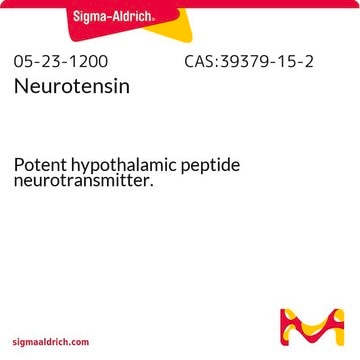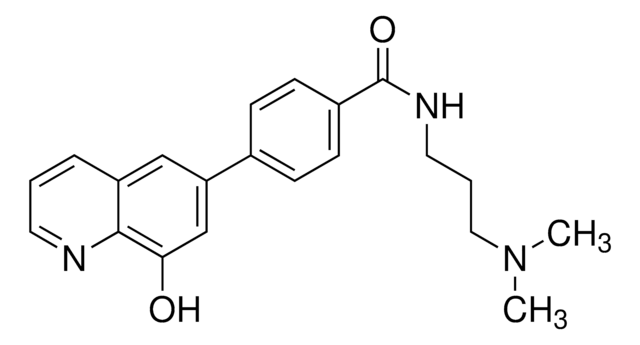K4394
PKF118-310
≥98% (HPLC)
Sinónimos:
1,6-Dimethyl-pyrimido[5,4-e]-1,2,4-triazine-5,7(1H,6H)-dione, Toxoflavin, Xanthothricin
About This Item
Productos recomendados
Quality Level
assay
≥98% (HPLC)
form
powder
color
white to light brown
solubility
H2O: 10 mg/mL, clear
storage temp.
2-8°C
SMILES string
CN1N=CN=C(C1=N2)C(N(C)C2=O)=O
InChI
1S/C7H7N5O2/c1-11-6(13)4-5(10-7(11)14)12(2)9-3-8-4/h3H,1-2H3
InChI key
SLGRAIAQIAUZAQ-UHFFFAOYSA-N
Biochem/physiol Actions
signalword
Danger
hcodes
Hazard Classifications
Acute Tox. 2 Oral
Storage Class
6.1A - Combustible acute toxic Cat. 1 and 2 / very toxic hazardous materials
wgk_germany
WGK 3
flash_point_f
Not applicable
flash_point_c
Not applicable
Certificados de análisis (COA)
Busque Certificados de análisis (COA) introduciendo el número de lote del producto. Los números de lote se encuentran en la etiqueta del producto después de las palabras «Lot» o «Batch»
¿Ya tiene este producto?
Encuentre la documentación para los productos que ha comprado recientemente en la Biblioteca de documentos.
Artículos
Cell cycle phases (G1, S, G2, M) regulate cell growth, DNA replication, and division in proliferating cells.
Cell cycle phases (G1, S, G2, M) regulate cell growth, DNA replication, and division in proliferating cells.
Cell cycle phases (G1, S, G2, M) regulate cell growth, DNA replication, and division in proliferating cells.
Cell cycle phases (G1, S, G2, M) regulate cell growth, DNA replication, and division in proliferating cells.
Nuestro equipo de científicos tiene experiencia en todas las áreas de investigación: Ciencias de la vida, Ciencia de los materiales, Síntesis química, Cromatografía, Analítica y muchas otras.
Póngase en contacto con el Servicio técnico









